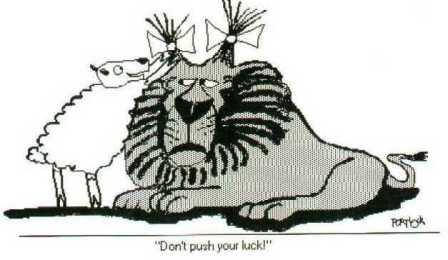 In England, Catholics are already using the new, corrected ICEL translation of the Order of Mass. Fr. Finigan, mighty p.p. of Blackfen, has an interesting post about a reaction to the new, harder words in the Creed.
In England, Catholics are already using the new, corrected ICEL translation of the Order of Mass. Fr. Finigan, mighty p.p. of Blackfen, has an interesting post about a reaction to the new, harder words in the Creed.
Excerpt:
The mother of a young family was talking to me today about the new translation of the Mass. She said that her children have really latched onto the word “consubstantial” and look forward to it in the Creed. They were disappointed last week because we did not say the Creed at the school Mass (it was a weekday.)
[…]
Read the rest over at Fr. Finigan’s place.
Isaiah 11:6.



































Cool. Give them a chance to exercise their minds and they will do it.
I first learned the word at the age of eight in First Holy Communion prep. Of course, children are usually capable of learning much more than we give them credit for, which is why I had a small Montessori school at one time. Children as young at three can understand numbers, not merely count, and long words intrigue them. If one is teaching Latin, such as in the Prima Latina and Latina Christiana programs, children learn quickly and well. http://www.memoriapress.com/descriptions/Latina1.html
That IS very cool!
BTW, I love the picture of the Child Jesus leading the beasts of Isaiah’s vision, and the drawing of the lion and the lamb (‘Don’t push your luck!’). : )
It does have a good rhythm to it. You can sing it to the “Hallelujah Chorus,” for example.
As itty-bitty first-grade tykes in Sunday School, we were saying “being of one substance with the Father” from Cranmer’s translation, and having no problem with it.
In fact, we had fun with long words — topping “supercalifragilisticexpealidocious” with “antidisestablishmentarianism” and “floccinaucinihipilification”. We couldn’t always pronounce them correctly, and we were a little fuzzy on what they meant (especially the Establishment controversy) . . . but we still had fun with them.
Kids can do a lot more than we expect – which is why low expectations are so bad for everyone concerned.
AnAmericanMother, you’re making me nostalgic for “thine inestimable love,” not to mention “unfeignedly thankful”! I don’t remember ever having a problem with the meaning of either in early years (though the first was and is something of a tongue-twister).
Love both the pictures — the one above makes me think of Aslan in C.S. Lewis’ Narnia series.
Memory is a funny thing. “Unfeignedly thankful” immediately calls forth “and that we show forth thy praise, not only with our lips, but in our lives, by giving up our selves to thy service, and by walking before thee in holiness and righteousness all our days.”
Amazing how something that is memorized in grade school sticks with you. The 28 book was abandoned in the 70s, iirc.
Hi, Father Z., I have latched onto some words you used at the beginning of this article: “new, corrected ICEL translation of the Order of the Mass.” I am not in the least taking exception with the words you’ve used, I am merely using this as a chance to ask a question. This question is probably one that would make most uncomfortable, but I’m asking it because I want to know what you think:
What is your thought on the reasoning behind the Archdiocese of Kansas City, Kansas (where I am subject) printing in it’s news publication The Leaven (http://www.theleaven.com/past_issues.html) on several ocassions that there were no errors in the ICEL translation of the 1970 Missal, that this translation has served us well, and giving the general sense (implicitly) that an evolution of doctrine has been going on that required a new english translation? [1) There are lots of errors in the lame-duck ICEL translation. Some of the errors are by omission, some commission. If they meant doctrinal errors, I would say the same. The errors by commission are few, but there are some. I have in mind phrases, for example and off the top of my head, like “help us to seek the values that will bring us lasting joy in this changing world”. And there is an overall “error” in a rather “Pelagian” attitude of the orations. 2) I think the translation has not served us well. As a matter of fact, it was attempted to be changed in the 90’s and we have now changed it. I think the old translation did us harm by dumbing down the language of worship. 3) Evolution of doctrine in the new, corrected translation? I would say quite the opposite. Comparing the new and old translation to the Latin suggests that there was an attempt to devolve doctrine in the old version. On the other hand, perhaps what that refers to is the change in the emphasis in doctrine in the LATIN originals of the Novus Ordo which were not accurately translated into the lame-duck ICEL version. There was a huge doctrinal shift in the LATIN prayers of the Novus Ordo.]
I recently realized that the Lion of Judah is also The Lamb. I knew of both His titles already, but it is interesting to ponder the seeming contrast, especially while reading Isaiah.